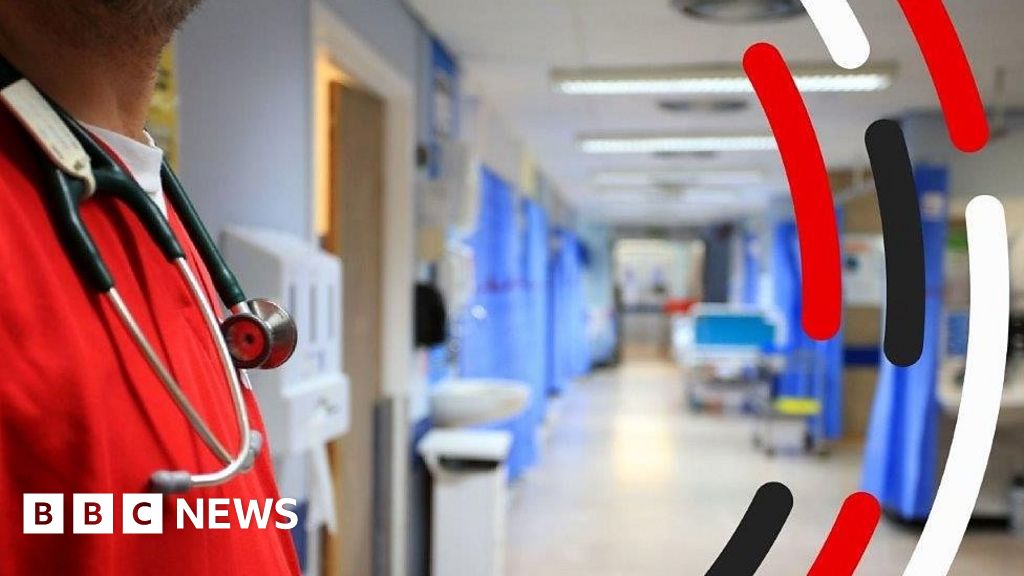Cowper’s Cut 251: Just like déja vu, all over again - Karl trumps Groucho

"Men make their own history, but they do not make it as they please; they do not make it under self-selected circumstances, but under circumstances existing already, given and transmitted from the past."
Karl Marx, 'The 18th Brumaire of Louis Bonaparte'
Deeply depressing data out from the @ONS this morning.
— Ed Conway (@EdConwaySky) January 5, 2023
More people died in England/Wales in the penultimate week of 2022 (14.5k) than in any week since Feb 2021, the tail-end of the second wave of the pandemic. pic.twitter.com/Tud5OTzkvG
As Marxists go, I've always been more Team Groucho than Team Karl.
But to borrow and invert Comrade Karl Marx's famous introduction from 'The 18th Brumaire of Louis Bonaparte', NHS policy and political history repeats itself: the first time as farce; the second time as tragedy.
Here we go again.
Again.
Back to the future
A major national medical organisation states that the NHS budget needs an immediate increase by one-sixth. Suggestions from their official spokesman as to how this could be funded include "hotel charges in hospital, top-up insurance, charges for GP visits, an extra health stamp, or even a sweepstake".
That's very 2023, no?
No.
This happened almost half a century ago, back in 1974 - as Nick Timmins' magisterial March 2017 article for Prospect showed.
As Nick rightly put it, "debates about organograms and “quasi-markets” are beside the point when there is a lack of resources and when nominally free-standing Foundation Trusts find themselves with fixed financial targets that they are failing to meet, while their regulator, NHS Improvement, responds by asserting some traditional central command and control".
This piece was published, remember, just shy of six years ago.
A political choice
It is literally impossible to argue that the Government have not been amply, clearly and frequently warned of the current NHS crisis, which has been a long time coming.
The urgent care crisis was being flagged a decade ago, in 2013.
Nick's prophetic piece, published in 2017, was three whole years pre-pandemic.
The state of the NHS in January 2023 is not an accident in any way, shape or form.
It's not a 'whoops!'
Nor is it the result of the Covid19 pandemic, as the Government loves to pretend.
This isn't inadvertent: it's indifferent. It is a deliberate political choice.
Nick wrote six years ago, "for the first time in more than a decade, hospital corridors are regularly lined with patients, often elderly, awaiting a bed".
His analysis remains (as ever) worth revisiting: "ahead of the 1987 election, the NHS was told to “keep the lid on,” which it chiefly did by not paying suppliers. When the hapless John Moore became social services secretary, Ian Mills, the director of financial management on the NHS Executive, had to tell ministers that the NHS owed so much that it was “technically bankrupt.”
"When Moore made a settlement with the Treasury that the NHS knew it could not live with, the lid came off. Over the autumn, some 4,000 beds shut. The newspapers were filled with horror stories from the wards.
"One of the, quite literally, killer moments came in December at the Birmingham Children’s Hospital. A shortage of intensive-care nurses led to the life-saving operation needed by David Barber, a baby with a hole in his heart, being cancelled five times in six weeks; he eventually had the surgery but died days later.
"In January 1988, Thatcher appeared on Panorama to claim that an NHS review, which had not in fact been set up, was under way."
And here we are.
Again.
In January 2023.
Again.
And we have been here before.

It's just like deja vu all over again, isn't it?
The politics
Things are obviously going terribly well in the NHS when The Paper Of Record is doing a live page on how terrible things are.
Alas, The Times doesn't offer any serious critique of 10 Downing Street's implausible explanation about why January 2023 is such a shitstorm, reporting tamely that "the Prime Minister’s spokesman conceded that the NHS"s “unprecedented challenge” was an issue ministers had already “recognised and have been seeking to address with additional funding into the system.
"I think we are confident that we are providing the NHS with the funding it needs — and as we did throughout the pandemic — to deal with these issues ... we have been up front with the public long in advance of this winter that because of the pandemic and the pressures it’s placed on the backlog of cases that this would be an extremely challenging winter, and that is what we are seeing.”
"Asked if the PM thought the NHS was in crisis, the spokesman said: “This is certainly an unprecedented challenge for the NHS brought about, as I say, by a number of factors — most significantly the global pandemic.”
Manifest round objects
Clearly, this is manifest round objects.
There’s one bit from Number 10 in this piece that’s not a blatant lie: the PM's spokesman “said the government was doing “everything possible” to increase the number of beds available.”
This is true.
Because when you don’t have the workforce, infrastructure, strategy and change management capability to expand capacity, there’s nothing you can do.
And nothing is exactly what the Government is doing. The smart journalists, such as The Spectator's Isabel Hardman, noticed this some time ago, and keep on saying it.
Kiss my speech
The New Year's relaunch speech by PM Rishi 'The Brand' Sunak was remarkable, but not in a good way.
Delivered like a third-rate chatbot Tony Blair on Ritalin, its content was no better than the delivery, ranging as it did all the way from the fatuous to the implausible.
There are some delicious passages: "the cost of living, too high. Waiting times in the NHS, too long. Illegal migration, far too much." One wonders which political party has been running the UK Government since 2010.
The Brand's explanation that "many of these challenges are at least in part, the legacy of Covid and impacted by the war in Ukraine" is pure comedy, given what everybody in possession of a clue knows about pre-pandemic NHS waiting times.
The PM's pledge that "NHS waiting lists will fall and people will get the care they need more quickly" is what can only be called 'helpfully non-specific'. As such, his mantra of "no tricks… no ambiguity" seems implausible.
The Spectator's new political editor Katy Balls (who replaces Mr Sunak's best mate, best man and now political secretary James Forsyth) speculates of the PM's NHS plans that "one quick fix could be to pay for more patients to be treated privately, but that would be a hard political sell".
If this is an accurate read of Number 10's thinking, then it is yet a further sign that they have absolutely no grasp of the nature or scale of the NHS crisis.
This Q&A response from the PM, reported by Health Service Journal, is spectacular: “[cancelling electives] is what we shouldn’t do. And that’s what we did during Covid: we stopped doing elective surgery. The amount of elective activity during covid was down to about half of what it normally does. The reason we’ve got a huge waiting list now is because we’re having to catch up on that.”
The reason we’ve got a huge waiting list now is, of course, not because we’re having to catch up on Covid cancellations.
The RTT elective waiting list (now 7.2 million) was already 4.4 million in January 2020, before Covid hit.
Mr Sunak refused three times to deny that he uses private healthcare in his interview with the BBC's Sunday With Laura Kuenssberg show.
'Everything is terrible: we won't change much'
So how did Labour leader Sir Keir Starmer do in his speech?

The late, great political analyst Alan Watkins proposed that New Labour's main policy pitch to voters in the couple of years before it took office in May 1997 was 'everything is terrible: we won't change much'.
Starmer's delivery was much better than Sunak's (although sound technical errors by pool broadcaster GB News made much of the live broadcast very hard to listen to).
The NHS content was minimal. Given the scale of the current crisis, it was telling that all we got was "we’ve got a fully costed plan for the biggest NHS training programme in its history. We’ll tackle the capacity crisis with more doctors, more nurses, more health visitors. And we’ll broker a fair pay agreement that will transform the pay and conditions for every carer in the country.
"Give care workers the respect and the status they deserve and help them drive up standards in our care system. That’s a massive part of the NHS crisis."
None of this is wrong: none of it is remotely sufficient to the scale of the challenge that they will face.
NHS Recovery Summit
You should always be aware of the Inverse Rhetoric Law in health policy: any self-styled 'summit' will not be a peak of achievement for anyone involved. So it proved with the Government's NHS Recovery Summit on Saturday.
Perhaps it was not a complete waste of time. The Sunday Times was briefed that the Discharge To Assess funding made available during the pandemic will be reintroduced, to help free up acute beds.
Of course it will be called something different: probably a Hospital Discharge Fund. Worth, oh, let's say £200 million.
Of the Government's March 2021 abolition of Discharge To Assess, there was naturally no mention.
I can’t imagine a more wrong-headed & expensive response that will result in worse outcomes for many older people & beyond the short-term is likely to reduce capacity in #socialcare. https://t.co/kYuYUrK5nU
— Richard Humphries 💚 (@RichardnotatKF) January 7, 2023
This may help hospitals, a bit, temporarily, by mid-March (by which time the seasonal respiratory pressures may be easing naturally). The problem returns when the freed-up acute beds get re-congested, because the flow of patients through hospitals has not been permanently fixed.
The Banker writes
Mind you, any glimmer of optimism about the NHS Recovery Summit should be offset by Health But Social Care Secretary Steve 'The Banker' Barclay's op-ed about it in the Boris Johnson Fanzine.
I've always wondered what a shrug would look like, if transcribed in writing, and The Banker has now provided the answer.
It isn't even possible to critique fatuousness of this depth and intensity. Telling the trades unions to engage, and claiming 'seriousness'; boasting of extra investment when the service has actually fallen apart: it's all present and incorrect. It's just convincing and persuading nobody.
Labouring under misapprehensions
Labour's health lead Wes Streeting reiterated many of his usual themes in this Times interview (more private sector, patients' champion), but also went long on the prospect of financial/structural redisognisation of NHS primary care.
NHS financial and structural redisorganisations rarely fill the experienced onlooker with joy, for good reasons.
"GPs should no longer be the sole gatekeepers of the NHS", Mr Streeting proposes. His proposals, however, are scarcely a quarter-baked: “the truth is that the way that GP practices operate financially is a murky, opaque business".
This is straightforwardly untrue. The GMS GP contract may be complex, but it is unquestionably rules-based.
Mr Streeting also tells The Times, “I’m minded to phase out the whole system of GP partners altogether and to look at salaried GPs working in modern practices alongside a range of other professionals.”
Mmmmmmm.
If not mmmmmmmmmmmmmmmmmmmm.
There are three very obvious blocks of problems with these ideas:
1. Polyclinics/Darzi Centres are pure ‘back to the future’ concepts. Does Mr Streeting know (and if so, can he say) why they didn't either happen or work the last few times they were pitched as The Solution?
2. Not only do we have no evidence that a non-GMS approach to delivering primary care will be more centrally-manageable or cost-effective, at the simply pragmatic level, but the cost of buying out all the extant GMS GP practice premises/surgeries in England to make this idea work would be very, very expensive. (Mr Streeting might also wonder why primary care was the one bit of the NHS that had efficiently-working IT first, by some considerable way. Hint: it's because of the business model.)
3. This direct self-referrals proposal relies on surplus secondary care capacity that simply doesn’t exist. Magical thinking is a poor guide to health policy.
This all reads disturbingly as if Ian Dodge's deservedly niche views on primary care were making a comeback.
The emergency emergency
And how is emergency access?
Surprise, surprise: it's getting worse.
“We cannot treat people in car parks”@RCEM_VP tells me “several hundred” people are dying each week because of delays in emergency care
— Sophy Ridge (@SophyRidgeSky) January 2, 2023
pic.twitter.com/i1Z3IR0Kso
And worse.
Harrowing words from a senior emergency medicine doctor showing the despair at not being able to provide the level of care every doctor hopes to for their patients. Every doctor, nurse & HCW can empathise with this right now.
— Becks 🩺 (@EmergencyMedDr) January 2, 2023
Shared w/ permission. Pls RT to get this out there. pic.twitter.com/tWHHJnWKVH
And worse.
A reflection on this. If the thresholds for a critical incident is shifting and there is no benefit from them, are we in effect normalising poor care across our health service? More trusts will follow this move in coming days: https://t.co/kmGsC7zrrp
— Shaun Lintern (@ShaunLintern) January 6, 2023
Writing in The Sunday Times, newly ex-KPMG Professor Mark Britnell detailed a personal family tragedy of bad care to highlight the system's information disconnectivity.
Mark is quite right. Fixing digital in the NHS won’t solve the current crisis, but it’s vital.
The Royal College of Emergency Medicine's leaders made various media appearances warning about the high number of avoidable deaths being caused by the current crisis. The figure cited was of 500 deaths a week being caused by the current access crisis, based on official excess death figures.
'Strategy' eats culture for breakfast
NHS England's director of 'strategy' Chris Hopson promptly went on the media and did what any self-respecting former chief executive of NHS Providers would do: he attempted to trash the data.
This 'strategy' is to say the least ambitious, given that there is peer-reviewed evidence in the Emergency Medical Journal which suggests that the 500 deaths number is probably about right.
Funny old world
It's a funny old world, though.
26/42 Are there any national datasets that accurately capture what is going on? The brilliant @jburnmurdoch has highlighted number of admissions into ICU. The message from his animated chart (click on link) couldn’t be clearer – this winter is v unusual: https://t.co/76ZvHU2pmV. pic.twitter.com/tu99YmS5TI
— Chris Hopson (@ChrisHopsonNHS) January 10, 2021
You see, I'm old enough to remember 2021, when Chris Hopson would do long threads on Twitter to draw attention to dodgy misuse of data. (Yes, I know I taught him how to do Twitter threads: so sue me.)
But the solution here is very simple for Chris. There's a grand total of one organisation which can get timely data about the number of deaths caused by the current delays to emergency care - and happily, Chris is its director of 'strategy'.
So NHS England just needs to publish weekly data on the number of deaths which clinicians attribute to the current massive delays in the NHS emergency care system. That is entirely within the organisation's remit, and will also helpfully conclude this debate, to the benefit of patients and providers alike.
Off you go, Chris.
The Alan comeback
Alexa play End of the Road by Boyz II Men pic.twitter.com/RsRyjHYRxH
— Dominic Penna (@DominicPenna) January 3, 2023
Sad-face. The end of an era for The Alan App. It was "iconic", apparently.
Still, we'll always have TikTok.
Cronyvirus and coronamillions update
— Lady (Michelle) Mone OBE (@MichelleMone) November 24, 2022
Tory peer Baroness Michelle Mone won't believe everything she reads or thinks, no doubt.
The Financial Times obtained legal documents regarding the Government's court case against PPE Medpro, which show that "PPE Medpro tried to sell the UK medical equipment with a safety report purportedly provided by a company that has denied authoring the document, the government has alleged in a £133 million lawsuit against the scandal-riven medical supplies group".
PPE Medpro also provided a test report from accreditation company Intertek, who denied issuing the document.
The Department For Health But Social Care also alleges that PPE Medpro "provided 72 lots of gowns stamped with a CE mark (which verifies that a product has been assessed by an accredited body: a legal requirement for products that need to be “sterile”. However, PPE Medpro did not include a number indicating which body had performed the accreditation."
Recommended and required reading
This BMJ comment piece, on how the NHS crisis shows the self-sacrifice of staff can no longer prop up the system, points out that the emergency care crisis in the NHS was the subject of serious warnings back in 2013.
Blog by Simon Wren-Lewis on NHS and real wage decline: why are we only now talking about trends that began over a decade ago?
The Boris Johnson Fanzine is at its very worst in this dreadful article about cardiac risk from Covid19 vaccines, based almost wholly on the notorious guesswork of notorious idiot Dr Aseem Malhotra.

